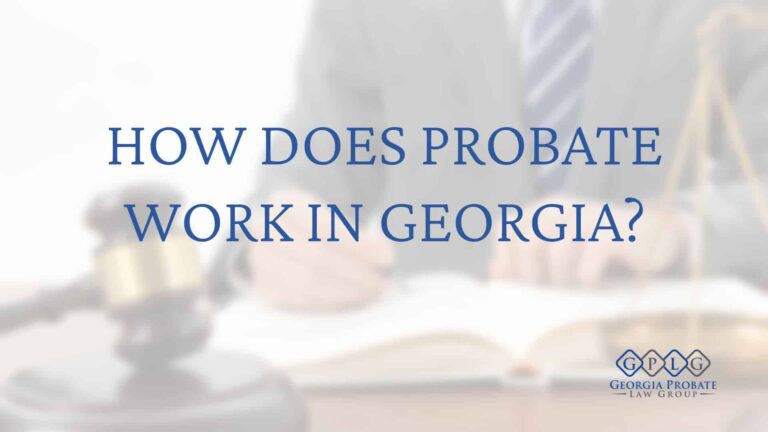When a person dies, there are specific legal proceedings that ensure the deceased’s assets will be distributed appropriately to the rightful heirs. If you have a loved one who passed away recently, you might wonder what the appropriate waiting time is to find out if you were included in their will or if you’ll inherit any share of the deceased’s estate. How long after a person dies will beneficiaries be notified in Georgia?
You might think it might be too insensitive or too soon to ask something like this, but it’s still an important and valid question. If, in other articles, we explained details related to the probate process, we’ll detail the surrounding beneficiary notifications in this post.
Who Reads a Will After Death?

Before going further, you must know that there is typically no such thing as an official reading of the will in front of the surviving spouse and all the family members.
This only happens in movies and TV shows.
In reality, usually, the named executor will read the deceased’s will. Moreover, who reads the decedent’s will may depend on whether the testament has been submitted to probate yet:
- The estate-named executor (and, if necessary, the coexecutors) – as they are the personal representatives chosen by the testator, they are responsible for the proper execution of all the estate’s fiduciary responsibilities.
- The beneficiaries named in the will – any beneficiary of a will can request a copy of the testament, as it indicates which share from the deceased person’s assets they may receive.
- Heirs-at-law and/or prior beneficiaries – who are not listed in the will but may feel they are entitled to a part of the estate. A copy may be given to the decedent’s heirs at law for challenges to the will’s validity.
- Successor trustee – in a pour-over will, the fund’s trustee has the right to receive a copy of the will to determine how the trust funds should be paid out.
After opening the estate with the appropriate probate court, the will becomes a public record, and any other interested parties can request a copy of the original will.
How Long After Death Is a Will Read?
Georgia has no specific timeline dictating how long after a person dies will beneficiaries be notified, when the executor should read the will, or how long the probate process should take. However, a will should be typically filed with the local probate court within six months after the decedent passes away.
Missing this deadline could lead to potential difficulties in estate management and cause potential legal issues. Therefore, we can say that the will should be read within this timeframe, and the beneficiaries should be notified promptly about the death of their loved ones.
Who Contacts the Beneficiaries of a Will?
According to Georgia law, once the probate court appoints the estate personal representative, the executor is required to notify the will’s beneficiary that:
- They are named as beneficiaries in the will.
- The estate has been opened in probate court.
- The court has appointed the nominated executor to officially administer the estate and distribute the decedent’s assets to the named beneficiaries in the last testament.
If You Are Named in a Will, How Are You Notified?
Once the probate judge has validated the will and appointed the estate executor, they have the duty to notify the beneficiaries in a will about opening the estate with the probate court and that they are designated to receive a share of the decedent’s inheritance.
Beneficiary notification ways
Generally, regardless of how long after a person dies will beneficiaries be notified, the state laws dictate the notification ways. The beneficiaries’ notification methods can vary from state to state.
However, there are several ways to notify beneficiaries and heirs in Georgia:
- USPS Certified Mail or Statutory Overnight Delivery – a signature will be required, ensuring there is a record of delivery.
- Signed Waiver – the will beneficiary may sign a waiver that waives the right to notification.
- Diligent Search – when the executor cannot find the estate’s beneficiaries, they may be able to file an affidavit with the court to show that an attempt has been made to find them.
How Long After a Person Dies Will Beneficiaries Be Notified?

On July 1, 2023, a new probate law went into effect in Georgia. There were new requirements on appointed executors, requesting them to send a notice of that appointment to the testament’s beneficiaries.
The Official Code of Georgia (“O.C.G.A.”) § 53-5-8) imposes that “within 30 days following the issuance of letters testamentary or letters of administration with the will annexed to the personal representative of a testate estate, such personal representative shall send to all beneficiaries by certified or registered mail or statutory overnight delivery, with return receipt requested, to his or her last known address a notice informing such beneficiaries of the issuance of such letters to the personal representative and providing the name, mailing address, and telephone number of such personal representative.”
However, notice is not required to be sent to any beneficiary who has waived in writing the right to receive such notice.
Within 60 days of the appointment, the executor must file copies of any such waivers and notices, the return receipts for each, “and, with respect to any such beneficiary whose identity and whereabouts are unknown, an affidavit of diligent search attesting under oath to the efforts of such personal representative to identify and locate such beneficiary.” O.C.G.A. § 53-5-8(b).
Deadlines for notification in Georgia
Some common timelines for notifying heirs and beneficiaries are:
- Initial notification: Within 30 days following the issuance of letters testamentary or letters of administration with the will annexed to the personal representative of a testate estate.
- Copies of waivers and notices, the return receipts for each: 60 days following the issuance of such letters, with respect to any such beneficiary whose identity and whereabouts are unknown, an affidavit of diligent search attesting under oath to the efforts of such personal representative to identify and locate such beneficiary.
You should know that if the executor fails to notify the beneficiaries, they might raise questions about what they may have done with estate assets. When this situation occurs, the decedent’s beneficiaries might file a petition with the probate court, forcing the executor to file a formal accounting.
When the executor has not even filed the decedent’s last testament, we advise the beneficiaries to speak to a probate lawyer, who could potentially help them file a petition to attempt to force the will’s filing.
Please note that these are only a few examples of potential deadline notifications in Georgia and that there may be others in your specific situation. Please contact a probate attorney regarding your specific situation if you have any questions about deadlines for notification in Georgia.
What Happens If You Expect to Be a Beneficiary of a Will and You Are Not Notified?
If you believe you are a beneficiary of a late person but you haven’t received any formal notification yet, here are some potential reasons:
- You are not among the beneficiaries nominated in the valid will.
- The estate’s personal representative hasn’t yet probated the will with the probate court.
- The decedent’s estate includes non-probate assets that don’t require probate. In this case, you’ll receive a notification only when you were designated a direct beneficiary of one of those non-probate assets.
- The estate’s personal representative may not be aware of the procedures for notifying beneficiaries in Georgia.
How Long Does It Take to Receive an Inheritance from a Will?
The will’s beneficiaries will receive their share only after the estate’s executor pays the decedent’s outstanding debts, estate expenses, fees, and taxes.
Generally speaking, it would take between twelve and eighteen months to close a simple and non-conflictual estate. However, you should know that in Georgia, there are some factors that might influence the timeframe needed by the beneficiaries to receive an inheritance from a will, such as:
- The size and the complexity of the estate.
- The duration of each phase of settling the estate.
- Where they are in the probate process.
- Whether a will challenge or any issue may come up anywhere during the probate process.
Contact a Litigation Lawyer
Notifying the will’s beneficiaries is vital for estate administration, as they have specific expectations and entitlements. The estate executors play a critical role in ensuring that the estate’s beneficiaries are informed, their rights are respected, and the distribution follows the late person’s wishes.
We understand the complexities of the estate administration and the importance of clear communication between the beneficiaries and the decedent’s personal representatives.
Our experienced probate lawyers are here to assist both the estate beneficiaries and executors in navigating the probate process, addressing any asset distribution and answering any question about how long after a person dies will beneficiaries be notified. Feel free to contact our office at (770) 790-4362 and have a consultation with one of our team members.
More information
Disclaimer These websites have not been reviewed by Georgia Probate Law Group and are not endorsed or even recommended by Georgia Probate Law Group. These websites are additional resources that you can use to further your general education on this topic.
Disclaimer: The information above is provided for general information only and should not be considered legal advice. Our probate attorneys provide legal advice to our clients after talking about the specific circumstances of the client’s situation. Our law firm cannot give you legal advice unless we understand your situation by talking with you. Please contact our law office to receive specific information about your situation.



























